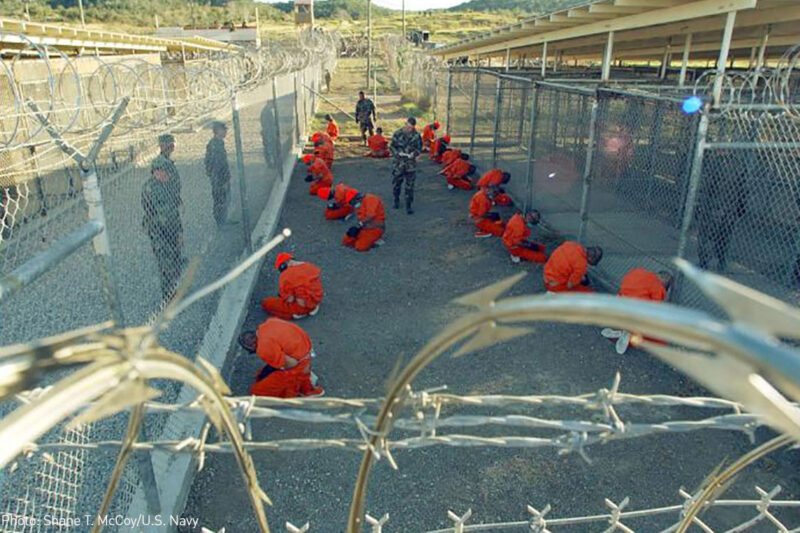
I’m sure you’ve seen the headlines or read the news on President Obama’s speech this week about the plan he sent to Congress to close the Guantánamo prison. But what’s really going on? And what new developments — good or bad — were buried in the speech and the plan? Here’s our take.
I hate to start with the bad, but the bad is bad enough that we should start there:
No end to indefinite detention or military commissions: Let’s start with the horrible news. The worst part of the plan is a scheme to bring detainees to the United States for continued indefinite detention or military commission trials. These harmful Guantánamo policies should end at Guantánamo, not be brought to the United States. Detainees should be brought to the U.S. if there’s evidence to try them in federal criminal courts here, not to continue indefinite detention or military commissions on American soil.
Congress will say “no” to the president’s plan: It didn’t take long for Congress to weigh in. In fact, Sen. Mitch McConnell (R-Ky.) and House Armed Services Committee Chairman Mac Thornberry (R-Texas) essentially said “no” to the plan before the president even gave his speech. (I guess McConnell got some practice with a preemptive “no” when just an hour after reports of Justice Antonin Scalia’s death, he said the Senate would not consider any Supreme Court nominee named by Obama.)
And now for the good (and it really is good):
President Obama cares A LOT about closing Guantánamo: The Pentagon sends reports to Congress all the time on lots of different issues. We hadn’t expected the president to say anything about the Pentagon sending this plan to Congress. Instead, he delivered the speech from the Roosevelt Room, showing steely resolve. No one can question whether the issue matters to the president.
The plan sheds light on how detainees are transferred overseas: As the president stated, Guantánamo ’s population has gone from 242 detainees down to 91 on his watch, with the vast majority of the detainees transferred overseas for repatriation or resettlement. The pace has been maddeningly slow, but the plan pulls back the curtain partway on the intense level of review and diplomatic and intelligence work that goes into each transfer.
The president promised to transfer overseas the cleared detainees: Thirty-five of the 91 remaining detainees have been cleared for transfer overseas, with many of them waiting seven or more years to be transferred out. We’ve heard this promise before from administration officials, but we hope that the president’s renewed determination will mean that now the pace will pick up.
The plan promises faster review of whether to clear more detainees: Forty-six of the 91 remaining detainees are in limbo — never charged with a crime, but never cleared to be sent home. The president years ago set up a Periodic Review Board to evaluate each detainee for clearance. But it has been extremely slow, leaving dozens of detainees waiting for their first hearing. The president said he is “accelerating” the PRB reviews, and his plan said all initial reviews will be done by this fall. That’s good news because the PRBs have so far found that 18 of 21 detainees who have gone through the process do not pose a security threat and can be transferred. This commitment to faster review could end indefinite detention for many detainees.
The president wants military commissions limited to the detainees already charged and not used for anyone else: The president recognized what has been obvious to everyone who has observed them — the military commissions, which apply to 10 remaining detainees, are rife with problems. “They are very costly, they have resulted in years of litigation without a resolution,” he said. He is keeping the commissions going for the 10 detainees already charged in them, but he is cutting them off for future use, saying “this type of use of military commissions should not set a precedent for the future.” While he should end them for all, without exception, it’s a step in the right direction to lay down this limit.
Future captures should be prosecuted in federal criminal courts: The president has been under intense pressure from Congress — particularly from the trio of Sens. Lindsey Graham (R-S.C.), John McCain (R-Ariz.), and Kelly Ayotte (R-N.H.) on the Senate Armed Services Committee — to support new indefinite detention authority and come up with a new prison to hold future captures without charge or trial. Instead, the president gave firm support for the value of federal criminal courts for future captures, stating “our preferred option, the most effective option for dealing with individuals detained outside military theaters, must be our strong, proven federal courts.” That’s certainly a presidential “no” to the voices clamoring to lock up more people without charge or trial.
There is a lot of work to be done over the remaining 11 months of the Obama presidency to end indefinite detention and close Guantánamo for good. While the events this week are a good kickoff to the final push, we must also ensure that indefinite detention and military commissions end when Guantánamo closes.
Stay informed
Sign up to be the first to hear about how to take action.
By completing this form, I agree to receive occasional emails per the terms of the ACLU's privacy statement.
By completing this form, I agree to receive occasional emails per the terms of the ACLU's privacy statement.


